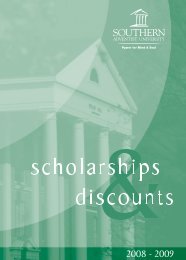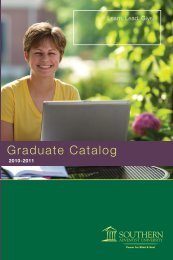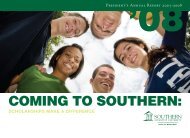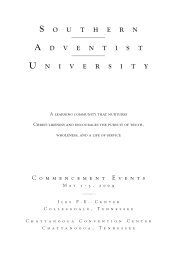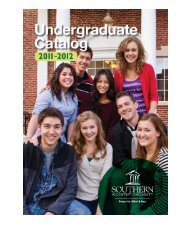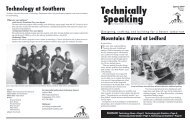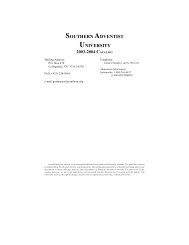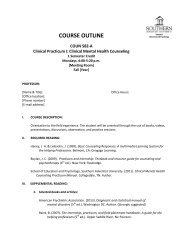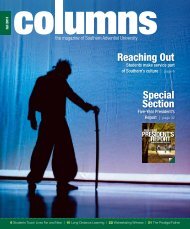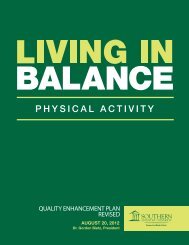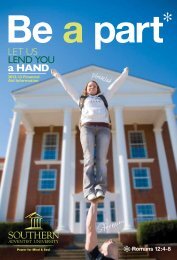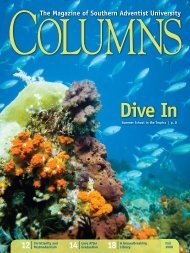July 2007 - Southern Adventist University
July 2007 - Southern Adventist University
July 2007 - Southern Adventist University
Create successful ePaper yourself
Turn your PDF publications into a flip-book with our unique Google optimized e-Paper software.
trading part of his meager foodrations for school supplies; sohungry was he for education.Wol, majored in theology atOakwood College, and becameversed in biblical Hebrew andGreek. He knows enough aboutthe difficulties of accurate translationto realize that he undertookwork that will take years.“God has placed a big projecton me,” Wol said, explaininghis translation work as otheryoung men drained out of hisdormitory to head out for springbreak.‘The brain is working’Wol will stay at the Collegefor the break. He’s hoping tocatch up on sleep and concentrateon the Bible translation hebegan three years ago.Wol works on the translationwith Angelo Amos Achuil,a Sudanese student who is studyingtheology at Andrews <strong>University</strong>,Oakwood’s sister college in BerrienSprings, Michigan. Achuil and Wolmet in the refugee camp in Kenya.Wol has translated 17 of theBible’s 66 books, and is at work onthe Psalms; Achuil has completedthe five books of Moses. ThoughWol speaks Dinka, Nuer, Arabic,English, and Swahili, the work taxeshis language abilities.“Some words, through prayerand fasting, the Lord will bring tomy mind,” Wol said, explaining hedevotes 10 to 12 hours each weekon the translation work.“It’s really good—because it’sexpanding. The brain is workinghard.”Some words, such as “chariot,”lie so far outside of Dinka experiencethat Wol is still trying to figureout what to call it.“We don’t use a chariot; we’venever seen a chariot,” Wol said,studying the screen on his laptopthat showed the translation he’swritten so far.He explains that traditionally,the Dinka were semi-nomadic, followingtheir herds with the changingwater levels along the upper Nile.Wol Bol Wol holds up the Dinka Rek translation of thewords “Holy Bible” during a recent interview.While the northwestern Darfurregion of Sudan remains in violentchaos, the southern portion, wherethe Dinka live, has returned to relativelypeaceful rebuilding after the20-year war that raged through thearea, Wol said.The Dinka are generally creditedwith introducing domesticated cattleto Africa. Neither during herdingdays or the more modern times, thathave come lately, have they comeacross chariots.“I’m still working on it,” Wolsaid.Heaven to the heartWol delights in the instanceswhere a Dinka idiom matches theoriginal Hebrew more closely thando English expressions. The texts inPsalms that refer to the “ends of theEarth,” for instance, Wol has translatedinto a Dinka expression, “tothe foot of the Earth.”The Hebrew word translated“ends” also means “extremities,” Wolsaid. “Like Dinka.”Beginning with the originalHebrew and Greek, Wol and Achuilconsult English translations and biblicaldictionaries to discover wordhistories and connotations. Theyhave long phone conversationsdebating the propertranslation of more obscurepassages. The study of Biblepassages has deepened forboth of them their understandingof the Bible—andtheir appreciation for thework of translators beforethem.“Many people don’t thinkof all the hardship translatorsexperience through putting ittogether,” Achuil wrote in ane-mail discussing their project.“It is a lot, a lot of work thatrequires a great deal of willpowerto keep going. It cantest your work ethics to thedeepest core of your being.”Neither Wol nor Achuilknows of a Bible translatedinto their own Dinka Rek,one of five Dinka languagesspoken by two millionpeople in Sudan. While some of theDinka languages do have a NewTestament translation, none has acomplete Bible. Dinka Rek, accordingto WorldScriptures.org, hasneither Old nor New Testamentstranslated.But the work is worth it, Achuilsaid.“There is nothing so profoundthan reading the sacred text in one’sown vernacular,” Achuil wrote.They expect that completingthe translation will take a few moreyears; they both dream of returningto their country to teach and preachthe Christian message out of a Biblewritten in their first language.“When you read your Bible, itbrings Heaven down to your ownheart,” Achuil wrote. “This is what Iwant for my people.”Bible in DinkaA website charting the progressof the translation of the Bibleinto Dinka Rek, a Nilotic-Saharanlanguage of Sudan, is http://drbt.seedoftruth.net/. Wol and Achuilwelcome sponsors for the project.<strong>July</strong> <strong>2007</strong> • TIDINGS 31



